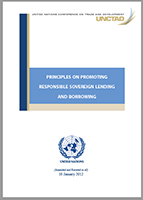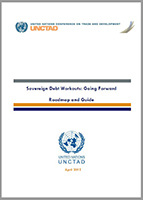The UNCTAD Principles on Promoting Responsible Sovereign Lending and Borrowing, published in 2012, set out the essential responsibilities of both lenders and borrowers of sovereign debt. They identify fundamental soft law concepts or norms of international law and their applicability to realm of sovereign debt crisis prevention.
The UNCTAD Principles represent a major advance in the area of soft law on sovereign debt crisis prevention and have widely been recognized as such in the international arena and at national levels. As they were developed on the basis of in-depth high-quality legal and economic research and a thorough and inclusive consultative process which sought to balance the diverse range of views of all stakeholders.
Close to 70 countries, relevant major international organizations, such as the IMF, the World Bank and the OECD, as well leading NGOs in the area were consulted during the drafting process for the UNCTAD Principles.
Core international legal norms and principles, such as Good Faith, Transparency, Impartiality, Legitimacy and Sustainability were also applied to processes of sovereign debt restructuring processes, in the UNCTAD Roadmap and Guide to Sovereign Debt Workout Mechanisms (2015) and in the UN resolution on Sovereign Debt Restructuring Processes, adopted in September 2015 by the United Nations General Assembly (A/RES/69/319).
Principles on Promoting Responsible Sovereign Lending and Borrowing
Sovereign lending and borrowing conducted in a prudent and disciplined manner can promote growth and development; but irresponsible financing can have harmful consequences for the debtor country, its citizens, its creditors, its neighbors and its trading partners.
These principles aim to promote more responsible behavior and provide economic benefit to both sovereign borrowers and their lenders.
They are also conceptualized in a holistic way and are thus meant to be applied to sovereign borrowers, developed or developing countries alike, as well as their lenders.
Roadmap and Guide to Sovereign Debt Workout Mechanisms
Following the 2008 global financial crisis, the socialization of losses from private debts and the subsequent emergence of sovereign debt crises in developing and developed countries, UNCTAD decided to make a proposal to improve the coherence, fairness and efficiency of sovereign debt workouts.
For this purpose, it established an ad hoc Working Group on a Debt Workout Mechanism in 2013 composed of stakeholders and independent experts.
The Roadmap is accompanied by a Guide, which provides an in-depth explanation of the principles and recommendations contained in this Roadmap.




